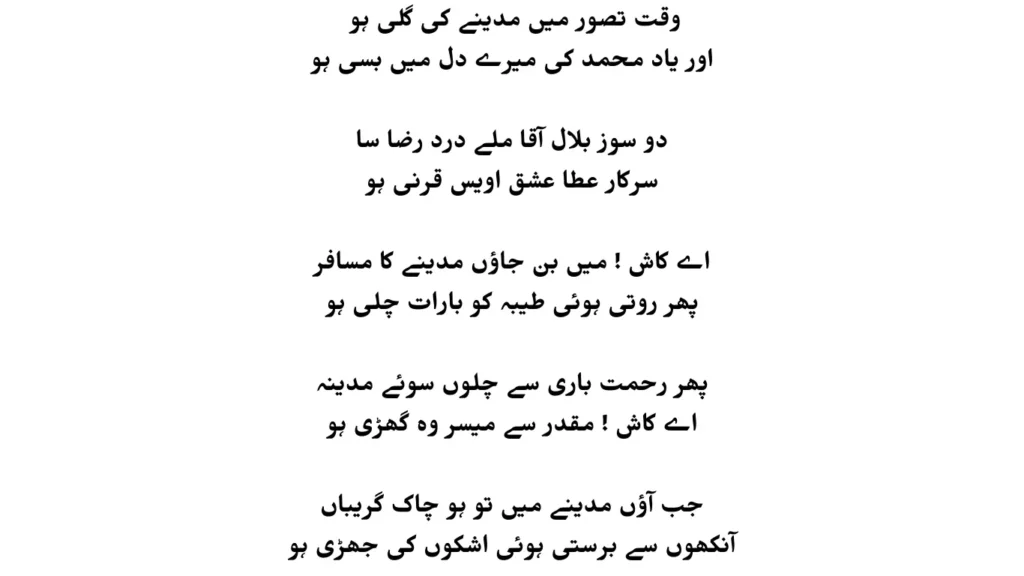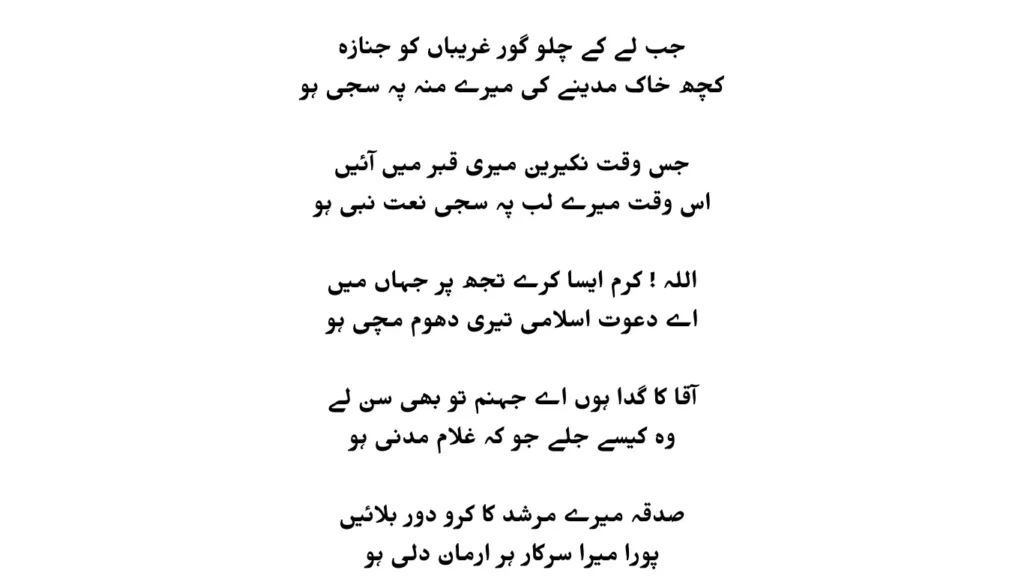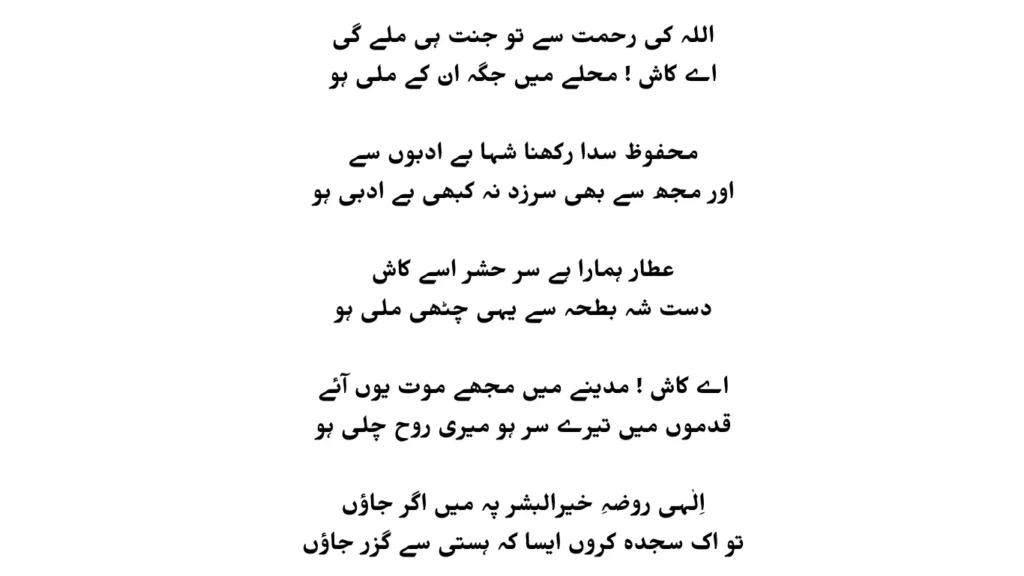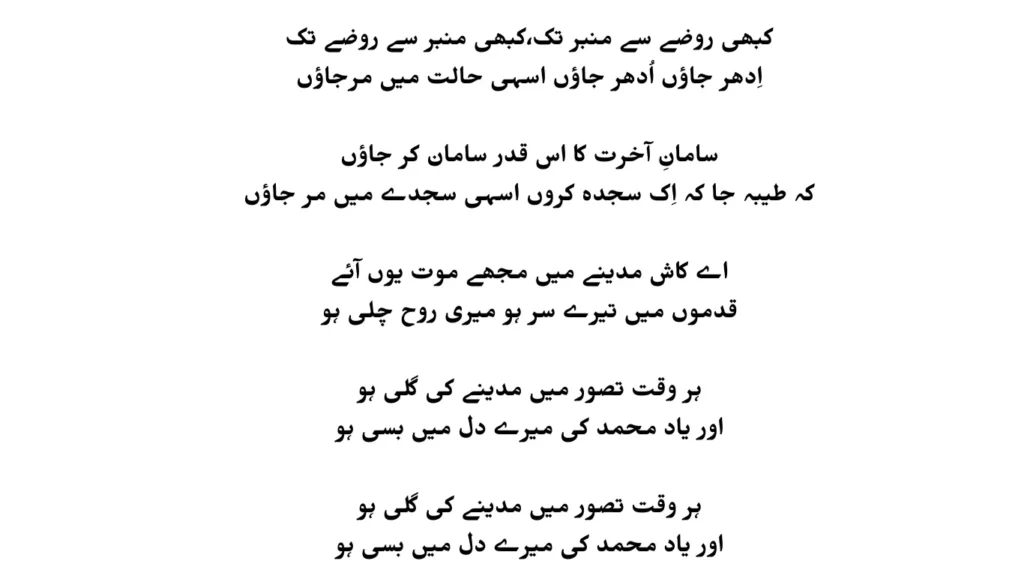har waqt tasawwur mein naat lyrics is a heartfelt expression of an individual’s longing for Madinah and their unwavering love for the Prophet Muhammad (PBUH). It paints a vivid picture of devotion, spiritual aspiration, and eternal connection to the sacred land of Madinah.
| Hum Madine Se Allah Kyun Aa Gaye Lyrics |
| Ae Rahe Haq k Shaheedo Lyrics |
| Tu Shahe Khuban Lyrics Tu Jane Jana |
| Tu Bari Sakhi Hai Fatima Lyrics in Urdu |
1. Har Waqt Tasawwur Mein Madine Ki Gali Ho
Translation:
“Every moment, let the streets of Madinah reside in my thoughts.”
This opening verse encapsulates the poet’s deepest desire to remain mentally and spiritually connected to the blessed city of Madinah. The line reflects a constant state of remembrance and devotion, where the streets of Madinah are a sanctuary in the believer’s imagination.
Significance:
This verse emphasizes the importance of spiritual proximity, even when physically distant. It signifies how Madinah becomes a central element of a believer’s inner peace.
2. Do Soz e Bilal Aqa Mile Dard e Raza Sa
Translation:
“Grant me the passion of Bilal and the pain of Raza.”
The poet aspires for the burning love and devotion of Hazrat Bilal (RA), who symbolized loyalty to the Prophet (PBUH), and the soulful expressions of Ala Hazrat Imam Ahmad Raza Khan.
Significance:
This verse highlights the desire for a deep, unwavering love for the Prophet (PBUH) that transcends worldly distractions, much like these revered figures in Islamic history.
3. Aye Kaash! Main Ban Jaoon Madine Ka Musafir
Translation:
“If only I could become a traveler to Madinah.”
The poet dreams of embarking on a journey to Madinah, imagining the joy and tears that would accompany such a blessed pilgrimage.
Significance:
This verse resonates with many Muslims’ aspirations, capturing the emotional yearning to walk in the footsteps of the Prophet (PBUH) and visit his beloved city.
4. Jab Aaoon Madine Mein To Ho Chaak Gareban
Translation:
“When I arrive in Madinah, may I be in complete humility.”
The poet expresses their wish to approach Madinah in a state of humility and spiritual surrender, overwhelmed by emotions and shedding tears of gratitude.
Significance:
This verse portrays the transformative power of Madinah, where one’s heart is softened, and all pride is replaced with sincere devotion.
5. Jab Le Ke Chalo Gor e Ghareeban Ko Janaza
Translation:
“When my funeral is carried to the grave of the humble, let it carry Madinah’s soil on my face.”
The poet envisions their final resting moments, hoping for the blessings of Madinah’s sacred soil to accompany them into the hereafter.
Significance:
This verse reflects the ultimate hope for a blessed end, symbolizing how Madinah’s sanctity can enrich one’s eternal journey.
6. Allah Ki Rehmat Se To Jannat Hi Milegi
Translation:
“By Allah’s mercy, Paradise will surely be attained.”
The poet expresses confidence in Allah’s mercy, while yearning for the special privilege of residing in proximity to the Prophet (PBUH) in Paradise.
Significance:
This verse reminds believers of Allah’s boundless mercy and the reward awaiting those who remain steadfast in their love and devotion.
7. Aye Kaash Madine Mein Mujhe Maut Yoon Aaye
Translation:
“If only I could die in Madinah with my head at your feet.”
This heartfelt plea signifies the poet’s ultimate wish to depart this world in the most sacred state — near the Prophet’s (PBUH) resting place.
Significance:
This verse serves as the culmination of the poet’s longing, portraying the ultimate spiritual fulfillment and a blessed end in Madinah.
har waqt tasawwur mein naat lyrics in urdu




FAQs:
The main theme revolves around constant remembrance of the Prophet Muhammad (PBUH) and a deep yearning to remain spiritually and physically close to Madinah.
Madinah holds immense significance as the city of the Prophet Muhammad (PBUH), symbolizing peace, blessings, and unparalleled spiritual connection.
The lyrics evoke love, longing, humility, and a profound connection to the Prophet (PBUH) and his blessed city.
Conclusion
“Har Waqt Tasawwur Mein” is more than just a naat; it is a deeply emotional and spiritual reflection that resonates with every believer. Through its evocative verses, it expresses the yearning for Madinah’s sanctity, the love for the Prophet (PBUH), and the ultimate hope for a blessed connection in this life and the hereafter. This naat serves as a source of inspiration and a reminder of the spiritual fulfillment found in unwavering devotion.




